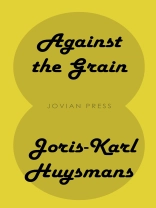French novelist Joris-Karl Huysmans is most famous for the novel À rebours (Against Nature). His style is remarkable for its idiosyncratic use of the French language, wide-ranging vocabulary, wealth of detailed and sensuous description, and biting, satirical wit. The novels are also noteworthy for their encyclopaedic documentation, ranging from the catalogue of decadent Latin authors in À rebours to the discussion of the symbology of Christian architecture in La cathédrale. Huysmans’ work expresses a disgust with modern life and a deep pessimism, which led the author first to the philosophy of Arthur Schopenhauer then to the teachings of the Catholic Church.
Circa l’autore
Charles-Marie-Georges Huysmans (5 February 1848 in Paris – 12 May 1907 in Paris) was a French novelist who published his works as J.k. (Joris-Karl) Huysmans ([ois kal]). He is most famous for the novel À rebours (1884, published in English as Against the Grain or Against Nature). He supported himself by a 30-year career in the French civil service.












